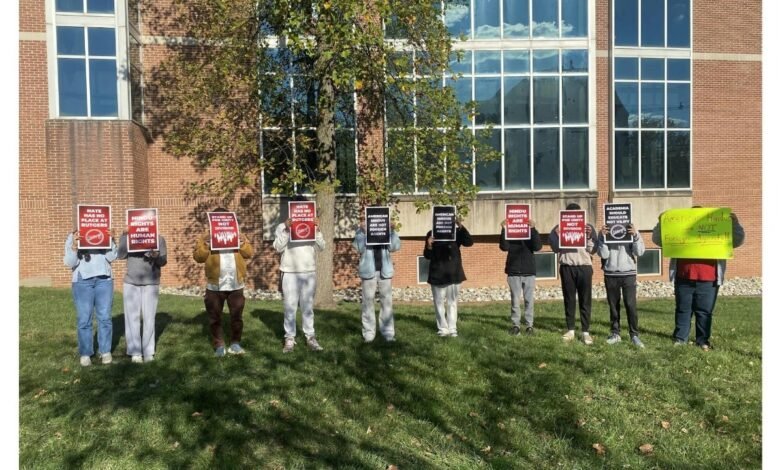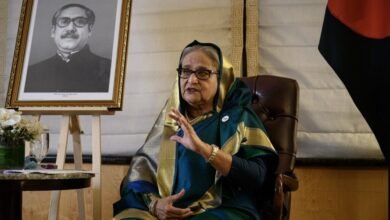US varsity holds Hindutva debate, faces backlash for excluding Hindus from it

US varsity holds Hindutva debate, faces backlash for excluding Hindus from it
A controversial panel discussion titled “Hindutva in America: A Threat to Equality and Religious Pluralism”, took place at Rutgers University in New Jersey, drawing sharp criticism from both US lawmakers and Hindu organisations. The organisers of the event, and the university itself, now face mounting pressure to clarify their role and neutrality in the debate. Hindu students also held a silent protest outside the event venue. Faculty members also participated in the officially permitted event.
The Coalition of Hindus of North America (CoHNA), an advocacy group, slammed the academic discussion for excluding Hindus in the panel.
“The event, framed as an academic enquiry, featured a panel that did not include a single practising Hindu but, nevertheless, made sweeping, uninformed claims about the faith,” CoHNA said in a statement issued on Tuesday.
The advocacy group also accused the organisers of the event of silencing those who questioned panellists’ claims.
“Notably, the non-Hindu panellists laboured to make an artificial and, frankly, preposterous distinction between Hinduism and Hindutva; and when practising Hindus asked questions, they were shut down,” it added.
Prior to the event, four US Congressmen, including two Indian-origin lawmakers, also sent a letter to the university, expressing concern over the event. The lawmakers described the event as “politically motivated and unfairly targeting Hindu students”.
Representatives Stanford Bishop, Suhas Subramanyam, Rich McCormick, and Shree Thanedar sent the bipartisan letter on October 24 to Rutgers, expressing support for Hindu students who say they feel targeted.
10,000 E-MAILS WERE SENT TO RUTGERS OVER HINDUTVA EVENT IN US
The advocacy group, which has mobilised opposition to the event, said more than 10,000 e-mails have also been sent to Rutgers administrators from students, parents, and community members urging the university to distance itself from what the group described as an “anti-Hindu” programme.
The advocacy group also criticised the event for ignoring the recent attacks on Hindu temples in the US.
“The talk itself was peppered with false claims, primary among them being the denial of Hinduphobia itself. There was no mention of the seven Hindu temples that have been vandalised across the US since December 2023 or of the hate crime data from states like California that show a rise in anti-Hindu hate, second only to antisemitism,” the group said.
The panellists also stated, incorrectly, that the Nazi Hakenkreuz is the same as the Hindu Swastika—even though there is a growing body of evidence that Hitler called his symbol the Hakenkreuz, not Swastika, according to CoHNA.
HINDU STUDENTS STAGE PROTEST AGAINST THE HINDUTVA EVENT AT RUTGERS
Hindu students peacefully protested outside the event but faced hostility from a supporter of the panel. It was an officially permitted protest. According to the university’s news website, faculty members also participated in the protest.
“It was scary to see an adult trying to dox us,” said one Hindu student on the condition of anonymity.
“So many of my peers wanted to attend the rally. But they were too scared to come because Rutgers ignored the letters we sent asking for fairness and safety,” CoHNA quoted the student as saying.
“We were not asking Rutgers to cancel the event—only to make clear that its institutional brand does not endorse the anti-Hindu rhetoric that has already sowed fear among Hindu students and vitiated the atmosphere on campus,” Rutgers Hindu chaplain Hitesh Trivedi said.
The protesters held up signs in front of Alexander Library to express their discontent with the university affiliating itself with anti-Hindu sentiments, according to Rutgers University’s news website, The Daily Targum.
Some of the signs read, “Hindu rights are human rights,” “Hate has no place at Rutgers,” and “American Hindus are not foreign agents.”
According to The Daily Targum, Sahar Aziz, a professor of law and Chancellor’s Social Justice Scholar at Rutgers Law School, moderated the discussion, and Audrey Truschke, professor in the Department of History and Asian Studies Director at Rutgers University—Newark, was the expert speaker.
– Ends
Source link



